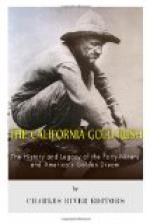The end of this row for precedence did not come until after the so-called battles at the San Gabriel River and on the Mesa on January 8 and 9, 1847. The first of these conflicts is so typical that it is worth a paragraph of description.
The Californians were posted on the opposite bank of the river. They had about five hundred men, and two pieces of artillery well placed. The bank was elevated some forty feet above the stream and possibly four or six hundred back from the water. The American forces, all told, consisted of about five hundred men, but most of them were dismounted. The tactics were exceedingly simple. The Americans merely forded the river, dragged their guns across, put them in position, and calmly commenced a vigorous bombardment. After about an hour and a half of circling about and futile half-attacks, the Californians withdrew. The total American loss in this and the succeeding “battle,” called that of the Mesa, was three killed and twelve wounded.
After this latter battle, the Californians broke completely and hurtled toward the North. Beyond Los Angeles, near San Fernando, they ran head-on into Fremont and his California battalion marching overland from the North. Fremont had just learned of Stockton’s defeat of the Californians and, as usual, he seized the happy chance the gods had offered him. He made haste to assure the Californians through a messenger that they would do well to negotiate with him rather than with Stockton. To these suggestions the Californians yielded. Commissioners appointed by both sides then met at Cahuenga on January 13, and elaborated a treaty by which the Californians agreed to surrender their arms and not to serve again during the war, whereupon the victors allowed them to leave the country. Fremont at once proceeded to Los Angeles, where he reported to Kearny and Stockton what had happened.
In accordance with his foolish determination, Stockton still refused to acknowledge Kearny’s direct authority. He appointed Fremont Governor of California, which was one mistake; and Fremont accepted, which was another. Undoubtedly the latter thought that his pretensions would be supported by personal influence in Washington. From former experience he had every reason to believe so. In this case, however, he reckoned beyond the resources of even his powerful father-in-law. Kearny, who seems to have been a direct old war-dog, resolved at once to test his authority. He ordered Fremont to muster the California battalion into the regular service, under his (Kearny’s) command; or, if the men did not wish to do this, to discharge them. This order did not in the least please Fremont. He attempted to open negotiations, but Kearny was in no manner disposed to talk. He said curtly that he had given his orders, and merely wished to know whether or not they would be obeyed. To this, and from one army officer to another, there could be but one answer, and that was in the affirmative.




